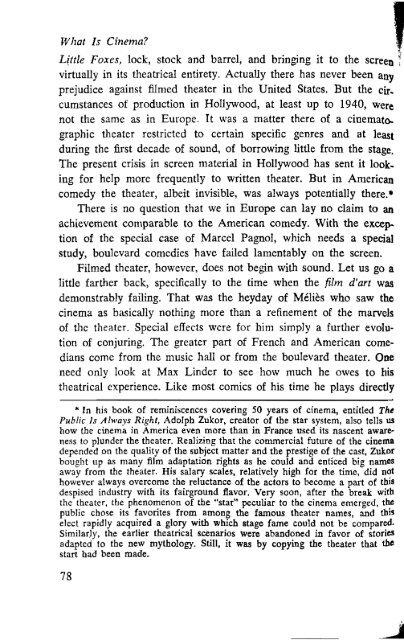Bazin,.Andre.-.What.Is.Cinema. - fading aesthetics
Bazin,.Andre.-.What.Is.Cinema. - fading aesthetics
Bazin,.Andre.-.What.Is.Cinema. - fading aesthetics
- No tags were found...
You also want an ePaper? Increase the reach of your titles
YUMPU automatically turns print PDFs into web optimized ePapers that Google loves.
<strong>What</strong> <strong>Is</strong> <strong>Cinema</strong>?,Little Foxes, lock, stock and barrel, and bringing it to the screen ~virtually in its theatrical entirety. Actually there has never been anyprejudice against filmed theater in the United States. But the cir ..cumstances of production in Hollywood, at least up to 1940, werenot the same as in Europe. It was a matter there of a cinemato..graphic theater restricted to certain specific genres and at leastduring the first decade of sound, of borrowing little from the stage.The present crisis in screen material in Hollywood has sent it look ..ing for help more frequently to written theater. But in Americancomedy the theater, albeit invisible, was always potentially there .•There is no question that we in Europe can lay no claim to anachievement comparable to the American comedy. With the exceptionof the special case of Marcel Pagnol, which needs a specialstudy, boulevard comedies have failed lamentably on the screen.Filmed theater, however, does not begin with sound. Let us go alittle farther back, specifically to the time when the film d'art wasdemonstrably failing. That was the heyday of Melies who saw thecinema as basically nothing more than a refinement of the marvelsof the theater. Special effects were for him simply a further evolutionof conjuring. The greater part of French and American comedianscome from the music hall or from the boulevard theater. Oneneed only look at Max Linder to see how much he owes to histheatrical experience. Like most comics of his time he plays directly* In his book of reminiscences covering 50 years of cinema, entitled ThtPublic <strong>Is</strong> A lways Right, Adolph Zukor, creator of the star system, also te1Js ushow the cinema in America even more than in France used its nascent awarenessto plunder the theater. Realizing that the commercial future of the cinemadepended on the quality of the subject matter and the prestige of the cast, Zulorbought up as many :film adaptation rights as he could and enticed big namesaway from the theater. His salary scales, relatively high for the time, did nothowever always overcome the reluctance of the actors to become a part of tbisdespised industry with its fairground flavor. Very soon, after the break withthe theater, the phenomenon of the "star" peculiar to the cinema emerged, thepublic chose its favorites from among tho famous theater names, and thi!elect rapidly acquired a glory with which stage fame could not be compared.Similarly, the earlier theatrical scenarios were abandoned in favor of storiesadapted to the new mythology. Still, it was by copying the theator that thestart bad been made.78





